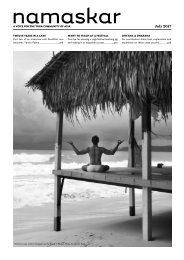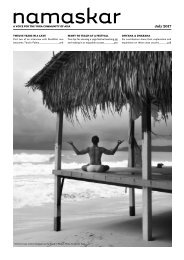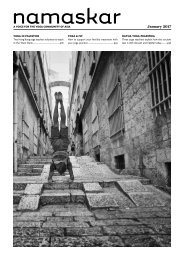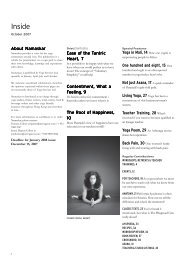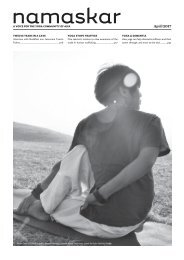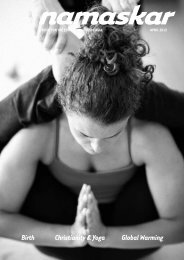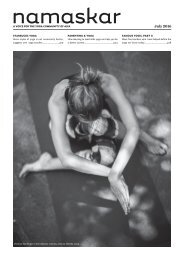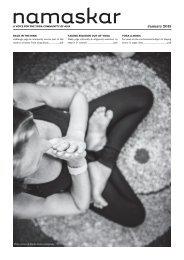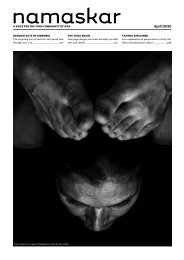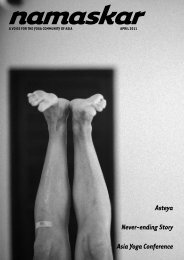Namaskar - Oct 09
You also want an ePaper? Increase the reach of your titles
YUMPU automatically turns print PDFs into web optimized ePapers that Google loves.
Dristi Santosha<br />
Jnanagni Kula precept 18: “The precept of contentment: Recognise the essential fullness<br />
and completeness. If you know you are missing nothing, the virtue of santosha or<br />
contentment arises. Essence is always full – situations are up and down. Contentment<br />
rests in the realisation of the innate wholeness of your essence.”<br />
Having taken initiation into a community of non-dual Tantrik practitioners I have vowed<br />
to sincerely dedicate myself to the expression of 21 precepts. I find that expressing the<br />
precept of contentment is always a choice I have, no matter what the circumstances of my<br />
experience. As we say, “pain in life is inevitable, but suffering is optional.”<br />
SANT<br />
ANTOSHA IS<br />
BALANCE<br />
Yogesvara Sarasvati<br />
However, as a scientist of my own experience I have clearly noticed my ability to both make<br />
this choice intellectually and to actually express and experience it without hypocrisy, denial,<br />
arrogance, or aloofness is directly related to my physical state of health. Of course, a more<br />
advanced practitioner is able to fully express enlightened virtues no matter what their bodily<br />
condition – the great Sri Ramana Maharshi comes to mind as he always remained in the<br />
state of santosha despite the terrible pain of bone marrow cancer, etc. But, for a beginner<br />
like me it is plainly obvious: when I am tired, depleted and somewhat sickly it is harder for<br />
me to find the simple contentment with life. Conversely, when I am replete, well rested<br />
and feeling limber, not much can get me down.<br />
Thus, in addition to the 21 precepts we all work hard to follow, there are the “three<br />
essential hallmarks of an authentic spiritual practice: 1. Primacy of the body, 2. Constant<br />
Awareness of one’s energy state, and 3.<br />
Practice where you are at, not where you<br />
want to be, or think you should be.” All of<br />
these hallmarks are intimately linked to the<br />
experience of santosha.<br />
As yogins we must know our bodies are the<br />
gateway to our freedom, or if treated with<br />
disregard, they are self-created prisons for<br />
our spirits. Knowing this, we practice<br />
“primacy of the body” and treat our bodies like the divine vessels they are. Therefore, not<br />
only do we avoid polluting ourselves with various poisons, toxins and other junk we like<br />
to call “food,” but we also don’t buy into the misinformation that abounds about crazy<br />
austerities, aggressive purification cleanses, and various other junk we like to call “yoga.”<br />
A Tantrik yogin must be juicy; with a full store of a quasi physical/spiritual substance we<br />
call “ojas.” To speak in very oversimplified terms, ojas is a rarified form of the water<br />
element. Our human experience consists of a delicate balance of the five elements: earth,<br />
water, fire, wind and space. Quite simply, when these elements are in harmony and<br />
balanced santosha arises naturally and effortlessly. And the opposite is true: when our<br />
elemental make-up is off kilter, no matter how hard we push and try, or “know” that<br />
contentment is always available, we simply won’t feel content. Santosha is balance and<br />
balance is santosha. At some point we just can’t fake it.<br />
Furthermore, while it is important to have all elements in harmony, the one element that is<br />
very specifically linked with santosha, contentment, is the water element. The water element<br />
is responsible for our sense of taste, our enjoyment of life, our sensuality, and quite<br />
importantly, it is intimately linked with our self-image formation and our emotional<br />
reactivity. Thus, we can short cut the whole five-element balance thing by going straight to<br />
the water element. If it is balanced, we will be healthy, content, at ease and enjoying the<br />
simple pleasure of being alive.<br />
However, it is because of this life-embracing philosophy that new-age tantriks have gotten<br />
yoga means taking a nap, sometimes it means<br />
skipping a meal, sometimes it means not caring<br />
about the rules and eating a hot dog<br />
11



